Health Justice Scholars Share Passion for Future Patients
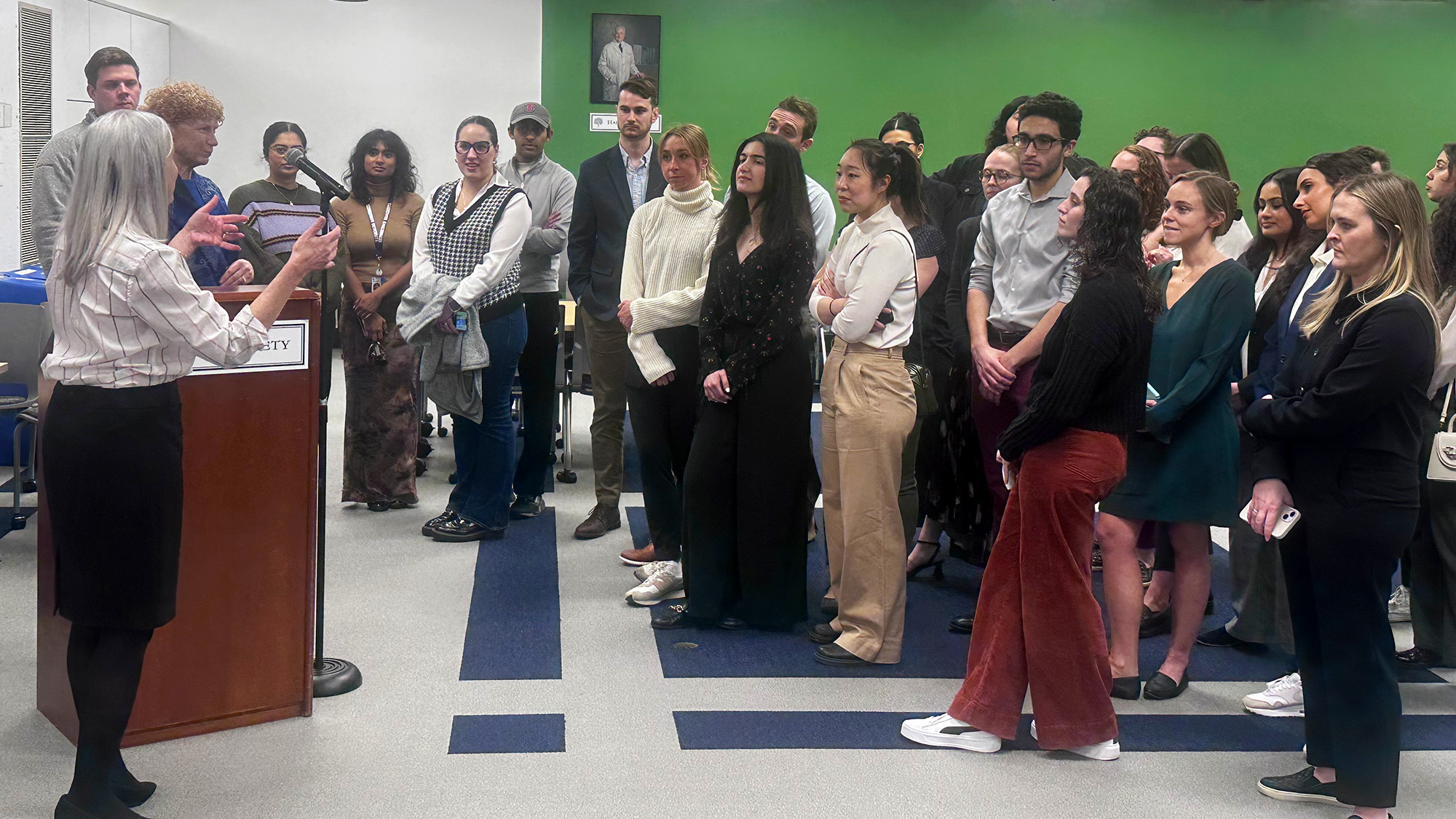
Posted in News Stories | Tagged health justice, Health Justice Alliance, Health Justice Scholar Track, student experience
(March 22, 2024) — For Health Justice Week 2024, fourth-year medical students on the Health Justice Scholar longitudinal academic track shared their capstone presentations on topics including barriers to health equity for transgender patients, how COVID-19 affected those with intellectual and developmental disabilities, addressing food insecurity and more.
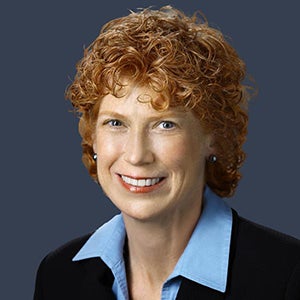
“These students have worked so hard and contributed so much toward health equity during their short time at the School of Medicine, and they never cease to amaze me with the depth and breadth of what they accomplish,” said Eileen Moore, MD, associate professor of medicine and family medicine at the School of Medicine and medical director of the Health Justice Alliance.
Health Justice Week is held in collaboration with the Health Justice Alliance (HJA), a medical-legal partnership between Georgetown’s medical and law centers. The HJA supports the Capitol Hill Advocacy Day program for second-year medical students and gives fourth-year medical students the chance to work with law students and faculty to help cancer patients, prisoners seeking compassionate release, pediatric patients and their families through the HJA Clinic, and poultry workers with Georgetown’s Harrison Institute for Public Law.
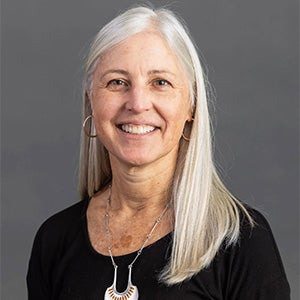
“Our goal is for Health Justice Scholar graduates to bring very unique and distinct interprofessional collaboration and advocacy expertise to their residency programs and future practices,” said Vicki Girard (L’87), JD, professor of law, legal practice at Georgetown University Law Center and HJA faculty director.
‘Putting Patients First’ Through Advocacy
In addition to his participation in the Health Justice Scholar track, Avery Ford, MHS (M’24), has taken part in advocacy events on Capitol Hill with the American Medical Association, the Student National Medical Association and as a Johnson & Johnson/National Medical Fellowship recipient. Through the Alliance for Inclusion in Medicine (AIM) fellowship, Ford learned about the Save Legs, Change Lives initiative, the subject of his capstone presentation.
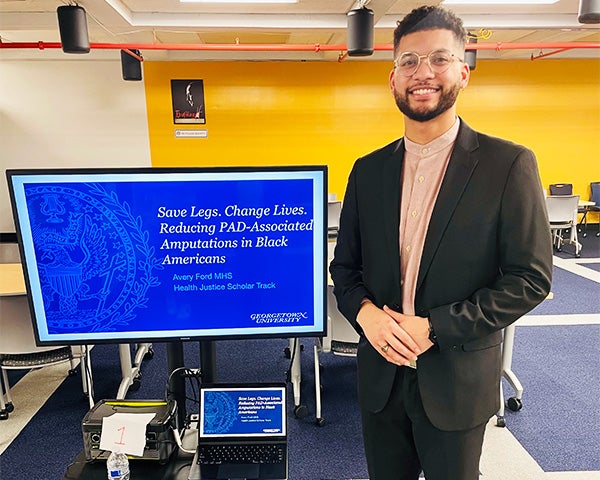
Black Americans are up to four times more likely than white Americans to have an amputation related to peripheral arterial disease (PAD), and 70% of those who undergo such amputations die within three years, Ford explained, motivating him to participate in community outreach and PAD-screening events in English and Spanish.
Reflecting on the clinical course of his grandfather, who sustained amputations, Ford felt driven to advocate for those facing similar circumstances. His clinical experiences on the Georgetown limb salvage rotation and during an international vascular surgery elective in Spain also informed his advocacy work.
Ford rejoiced when, with encouragement from the Save Legs, Change Lives initiative, Rep. Donald M. Payne Jr., D-N.J., introduced legislation that ensures screening for PAD is fully covered by insurance. “Because PAD is treatable, this screening coverage will aid in limb preservation and enhanced quality of life for all with PAD, especially those historically at disproportionate risk,” Ford said.
“To me, the Health Justice Scholar track exemplified my outlook of what a truly devoted physician can do in and outside of the clinic,” Ford said. “Working with lawyers and our legislators to simultaneously address gaps in health and justice has been an eye-opening experience that affirms the power of putting patients first.”
Supporting Underrepresented Patient Populations
A member of the LGBTQIA+ community, Brittany Brookner (M’24) served as president of the Hoya Medical Pride Alliance and created a patient panel of transgender women of color so students could hear about their experiences with health care. She also organized a series educating students about using gender- and sexuality-inclusive and affirming language.
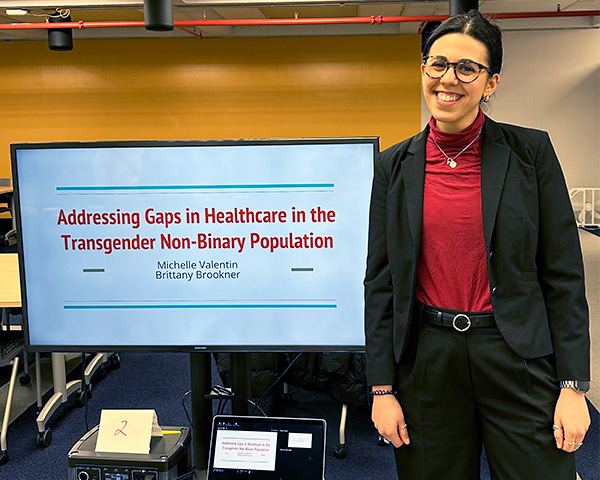
Brookner’s capstone presentation, “Addressing Gaps in Healthcare in the Transgender Non-Binary Population,” drew on those experiences and her interest in the subject. “Through these roles and events, I learned more about the systemic injustices that are present in underrepresented, under-treated and under-researched patient populations, specifically the transgender nonbinary population,” she said.
“For me, becoming a Health Justice Scholar was the first step to learning how to use my voice and social capital as a medical student and future doctor to advocate for issues beyond the four walls of the hospital,” Brookner added. “This experience showed me that my voice as a medical student and eventually as a doctor is not only appreciated, but also valuable and respected.”
Practicing Persistence
As a Health Justice Scholar, James Severin (M’24) did a monthlong rotation at a school-based health center in southeast DC, informing his capstone presentation.
“I received an up-close look at how school-based health centers work as well as the wonderful team and Dr. [Ana] Caskin operating them,” he said. “It was their effort, along with my experience giving me a deep belief in the importance of health care education and access to improve the health of others, that inspired the presentation.”
Being a Health Justice Scholar taught Severin about persistence. “While impacting policy on a state or federal level may seem daunting, there are plenty of avenues to get involved, and any little bit you can contribute is always appreciated,” he said. “So you learn to stay positive and relentless, and never give up.”
Fostering Greater Awareness
Suraya Poian (M’24) relocated to the U.S. from Russia with her family when she was a teenager. “Transitioning between countries proved challenging, yet serving as a translator for my family presented an even greater obstacle,” she said. “The most daunting aspect of this role was within the medical field, where accurately conveying information proved challenging.”
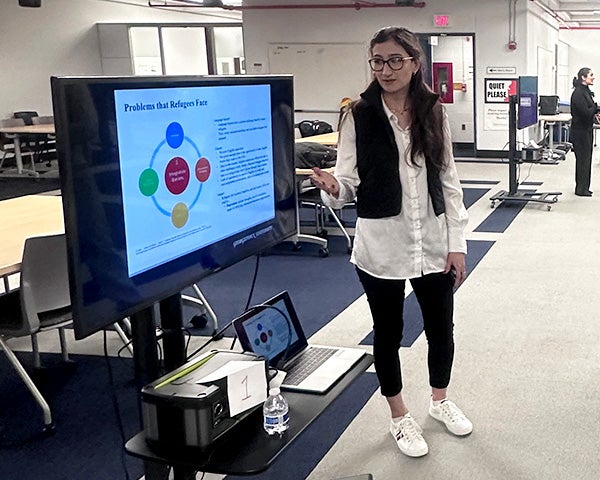
At Georgetown, Poian helped with resettlement efforts for Afghan refugees who arrived in the U.S. after the government collapsed, inspiring her to focus her capstone presentation on obstacles to health care for refugees.
Struggling with language barriers can have a substantial adverse impact on the health of immigrants, including depression and heightened suicidal ideation, Poian found.
“Immigrants receive only a few months of federal aid, after which families are expected to achieve stability and independence,” she said. “This pressure compels them to prioritize employment, leaving insufficient time for language instruction.”
“The more we discuss these issues, the greater awareness we foster,” Poian added. “Medical students should be encouraged to take action, learn to stand up for what is right, and be accountable.”
Kat Zambon
GUMC Communications
